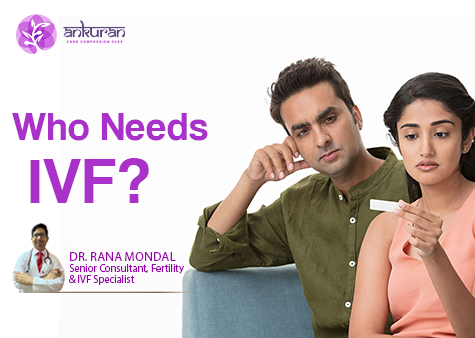Welcome to our blog where we unravel the mysteries surrounding In Vitro Fertilization (IVF). Whether you’re considering IVF for yourself or just curious about the process, we’ve got you covered. Let’s dive into the world of IVF and answer the burning question: Who Needs IVF?
Q: What is IVF?
- IVF stands for In Vitro Fertilization.
- It’s a fertility treatment where eggs are retrieved from a woman’s ovaries, who needs IVF and fertilized with sperm outside the body in a laboratory.
- The fertilized eggs (embryos) are then implanted into the woman’s uterus to establish a pregnancy.
Q: Who Needs IVF Treatment?
- Couples facing infertility issues: If you’ve been trying to conceive for a year without success (or six months if you’re over 35) due to factors like blocked fallopian tubes, endometriosis, or low sperm count, IVF could be an option.
- Individuals with genetic disorders: IVF with preimplantation genetic testing (PGT) allows screening for genetic disorders before implantation, reducing the risk of passing on hereditary conditions.
- Women with certain medical conditions: Some medical conditions or treatments (like cancer therapies) can affect fertility. IVF may offer a chance to preserve fertility before undergoing treatment.
- Same-sex couples: IVF treatment allows same-sex couples to have biological children by using donor eggs, sperm, or embryos.
- Single individuals: IVF enables single individuals to fulfill their dreams of parenthood using donor sperm or eggs.
Causes of Infertility in Females and Males those require IVF
Female Causes
Tubal Factor:
- Blocked or damaged fallopian tubes: Scar tissue, infections (such as pelvic inflammatory disease), Endometriosis or previous surgeries can obstruct or damage the fallopian tubes, hindering the natural movement of eggs and sperm.
- Ectopic pregnancies: Previous ectopic pregnancies may have caused damage to the fallopian tubes, making it difficult for eggs to travel to the uterus.
- Salpingectomy: Surgical removal of one or both fallopian tubes, often done to treat conditions like ectopic pregnancy or prevent recurrent tubal pregnancies.
Ovulation Dysfunction:
- Polycystic Ovary Syndrome (PCOS): Polycystic Ovary Syndrome (PCOS) is a hormonal disorder where the ovaries produce excessive amounts of androgens, leading to irregular ovulation or anovulation (lack of ovulation).
- Diminished ovarian reserve: A decline in the quantity and quality of a woman’s eggs, commonly associated with aging but can also occur due to certain medical treatments or conditions.
- Hypothalamic or pituitary disorders: Dysfunction of the hypothalamus or pituitary gland can disrupt the hormonal signals necessary for ovulation to occur.
Uterine Factor:
- Uterine fibroids: Benign tumors in the uterus that can interfere with implantation or blood flow to the endometrium, affecting embryo implantation.
- Uterine abnormalities: Structural abnormalities of the uterus, such as septate uterus or uterine adhesions (Asherman’s syndrome), can impair embryo implantation or cause recurrent pregnancy loss.
- Endometriosis: A condition where endometrial tissue grows outside the uterus, often affecting the ovaries, fallopian tubes, and pelvic tissues, leading to inflammation and scarring that may interfere with fertility.
Male Cause:
- Low sperm count (Oligospermia): A low concentration of sperm in the ejaculate, reducing the chances of fertilizing an egg.
- Poor sperm motility (Asthenospermia): Sperm with reduced ability to move and swim, making it difficult to reach and fertilize the egg.
- Abnormal sperm morphology (Teratospermia): Sperm with abnormal shape or size, which may affect their ability to penetrate the egg.
- Azoospermia: Absence of sperm in the ejaculate, either due to obstructive causes (blockage in the reproductive tract) or non-obstructive causes (problems with sperm production).
In each of these cases when IVF is required, IVF offers a solution by bypassing the natural barriers to conception and facilitating fertilization outside the body. By retrieving eggs directly from the ovaries of those women who need IVF, fertilizing them with sperm in the laboratory, and transferring the resulting embryos into the uterus, IVF can help individuals and couples overcome various infertility challenges and fulfill their dreams of parenthood.
Q: What Are The Age Considerations for IVF?
- Age plays a crucial role in IVF success rates.
- Younger women tend to have healthier eggs and better chances of success.
- Women over 35 may experience decreased fertility and may need more IVF cycles to achieve pregnancy.
- However, IVF can still be successful for older women who need IVF treatment, especially with advancements in technology and techniques.
Q: Are There Any Risks Or Side Effects Of IVF?
- As with any medical procedure, there are potential risks and side effects associated with IVF.
- These may include multiple pregnancies (like twins or triplets), ovarian hyperstimulation syndrome (OHSS), ectopic pregnancy, and emotional stress.
- However, advances in IVF techniques and careful monitoring by healthcare professionals help minimize these risks.
Q: How Can Someone Prepare for IVF?
- Consult with a fertility specialist: A fertility specialist can assess your individual situation and recommend the best course of action.
- Lifestyle changes: Maintaining a healthy lifestyle by eating nutritious foods, exercising regularly, and avoiding harmful habits like smoking or excessive alcohol consumption can improve your chances of success.
- Emotional support: IVF can be emotionally challenging. Seek support from loved ones, support groups, or counseling services to help you through the process.
In conclusion, IVF is a remarkable advancement in reproductive technology that offers hope to many individuals and couples struggling with infertility. Whether you’re facing infertility issues, pursuing parenthood as a same-sex couple or single individual, or dealing with medical conditions affecting fertility, IVF may be the solution you’ve been searching for. By understanding who might benefit from IVF and how to prepare for the process, you can embark on your journey towards parenthood with confidence and optimism. Remember, you’re not alone – there’s a whole community ready to support you every step of the way.



No Comments